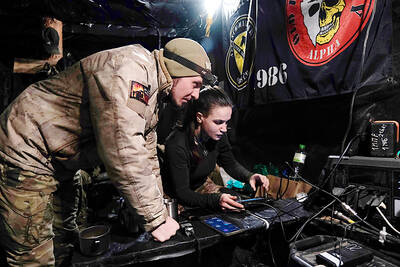Six weeks into a mission to stabilize Haiti, American troops have confiscated fewer than 150 weapons among the thousands held by rival factions. In not much more than six weeks, the US soldiers will give way to a UN force -- and the Americans are counting the days.
US troops are picking up trash, patrolling streets and continuing searches for weapons. It's the second such peacekeeping mission for the Americans in a decade, and many feel they are hampered by their 90-day mandate and hostility that contrasts sharply with the joyous welcome they got in 1994.
"I don't think three months is going to change much," said US Marine Staff Sergeant John Schultz, 34, of Hammond, Indiana.
Still, he finds Haiti a respite from Iraq: "I've been there twice, and each time I hope will be the last."
Haiti's crisis couldn't come at a worse time for US President George W. Bush's administration, which is attempting to fill a power vacuum created by Jean-Bertrand Aristide's departure while coping with mounting casualties in Iraq -- all during an election year.
On a one-day visit this week, US Secretary of State Colin Powell pledged support but made no long-term promises. He said the administration does not plan on spending more than the US$55 million earmarked for Haiti -- about US$20 million less than last year and a fraction of the US$235 billion that flowed months after the last intervention.
Less money means less chances of getting guns off the street, though everyone agrees that is the only way to secure the Caribbean country of 8 million people.
Yet there is no buyback program to entice Haitians to give up weapons and street gangs both for and against Aristide remain armed, along with motley groups of rebels.
A multinational force of 3,600 soldiers and marines -- more than half American, the rest Canadian, Chilean and French -- patrol the streets, clear garbage piles high enough to hide a sniper and secure key installations such as the airport and presidential National Palace.
The primary goal is to bring order ahead of the arrival of a UN force scheduled to take over in June. Brazil will lead the force and plans to send about 1,500 army, navy and air force troops. Other Latin American countries such as Peru, Chile and Argentina indicated they could contribute troops to the peacekeeping mission, expected to last six months.
The Americans arrived as Aristide supporters bewildered by his departure set up flaming roadblocks where they robbed motorists and killed some, looted businesses and warehouses, including one containing US food aid, and both sides in the conflict were carrying out reprisal killings.
While a semblance of order has been restored to the main cities, many provincial towns controlled by rival gangs or rebels sporadically erupt in violence.
Despite the brevity of their mission, the US troops have had their resolve tested. Early in the deployment, troops shot and killed six Haitians they said either fired on them or tried to run roadblocks. A handful of others were injured in gun battles.
Haitians accused the Americans of being trigger-happy and noted French troops have not once been fired at or used their firearms. US officers responded that the Americans patrol the most dangerous areas, the sprawling slums that are strongholds of Aristide supporters. In addition, the French speak a language close to Haiti's Creole.
To counter anger and win trust, US troops have scaled down patrols to help with small community projects.
"Here you can really see the efforts you make," said Gunnery Sergeant James Ganbrell, 29, from Grand Junction, Colorado. "It's not like Iraq. Most people know you're here to help and you can really walk away with a good feeling because of that."
"We're happy they're here," agreed Ronel Monpremier, 30, a laborer. "The country is still insecure, they're helping us feel a little safer."
But hostility and anger remain, fed by Aristide's claims that he was forced from power by the US on Feb. 29.
It's a vastly different scenario from the 1994 intervention when former US President Bill Clinton, overriding opposition from the US military, Congress and public, sent 20,000 troops to restore Aristide, Haiti's first democratically elected president. Those troops arrived after the Haitian military that ousted Aristide agreed to stand aside.
"The difference is we asked for American help in 1994," said Rodny Jean-Baptiste, a 32-year-old gas station attendant. "Today, the US troops aren't bringing anybody back and they're not really helping."
US troops must deal with armed pro- and anti-Aristide gangs and the rebels whose swift advance across Haiti led to Aristide's flight. In addition, the interim government installed with US support is seen as being an elite in a shady alliance with ex-soldiers in Aristide's army, including convicted human rights violators.
"It's hard to take seriously our efforts in Haiti given they [US Marines] are working alongside ... known killers,'' said US Representative Maxine Waters, a California Democrat who supports Aristide.
While US troops do not work with the rebels, they have done little to disarm them.
Some see the US-led operation as a stopgap providing only temporary relief in a country bedeviled by violence since its independence 200 years ago.
"The potential for errors is much higher this time because the international forces have less control over the population," said Alix Fils-Aime, a security adviser under Aristide in 1994. "There are more armed gangs now who are not going to give up."

THE TRAGEDY OF PUNCH: Footage of the seven-month-old Japanese macaque has gone viral online after he was rejected by his mother and formed a bond with a soft toy A baby monkey in Japan has captured hearts around the world after videos of him being bullied by other monkeys and rejected by his mother went viral last week. Punch, a Japanese macaque, was born in July last year at Ichikawa City Zoo. He has drawn international attention after zookeepers gave him a stuffed orangutan toy after he was abandoned by his mother. Without maternal guidance to help him integrate, Punch has turned to the toy for comfort. He has been filmed multiple times being dragged and chased by older Japanese macaques inside the enclosure. Early clips showed him wandering alone with

Australian Prime Minister Anthony Albanese yesterday said he did not take his security for granted, after he was evacuated from his residence for several hours following a bomb threat sent to a Chinese dance group. Albanese was evacuated from his Canberra residence late on Tuesday following the threat, and returned a few hours later after nothing suspicious was found. The bomb scare was among several e-mails threatening Albanese sent to a representative of Shen Yun, a classical Chinese dance troupe banned in China that is due to perform in Australia this month, a spokesperson for the group said in a statement. The e-mail

‘OCCUPATION’: Hong Kong said it had lodged ‘stern protests’ with Panama’s consulate, and would ‘staunchly support’ the rights and interests of Hong Kong companies Panamanian President Jose Raul Mulino on Monday ordered the temporary occupation of two ports run by a unit of CK Hutchison Holdings Ltd following the Supreme Court’s ruling against the firm’s concession, escalating a dispute that has become a proxy battle between the US and China in Latin America. Mulino said in a speech that the administration and operation of the two ports on the strategic Panama Canal is to revert to the country’s National Maritime Authority to ensure their uninterrupted, safe and efficient operation. The occupation covers movable equipment at the ports and does not mean a definitive loss of

GAME CHANGER The Russian invasion of Ukraine has shown the utility of small drones for recon, for supporting logistics and for killing across the modern battlefield Five European nations have announced a new program to produce low-cost air defense systems and autonomous drones using Ukrainian expertise, hard-won over the past four years fighting against Russia. Friday’s initiative of the five nations — France, Poland, Germany, the UK and Italy — comes as one of many European efforts to bolster defense along their borders, like a “drone wall ” with Russia and Ukraine to better detect, track and intercept drones violating Europe’s airspace. Both Moscow and Kyiv have cutting-edge drone warfare capabilities forged in the grim laboratory of war where battlefield innovations have rewritten modern battle tactics. Poland is